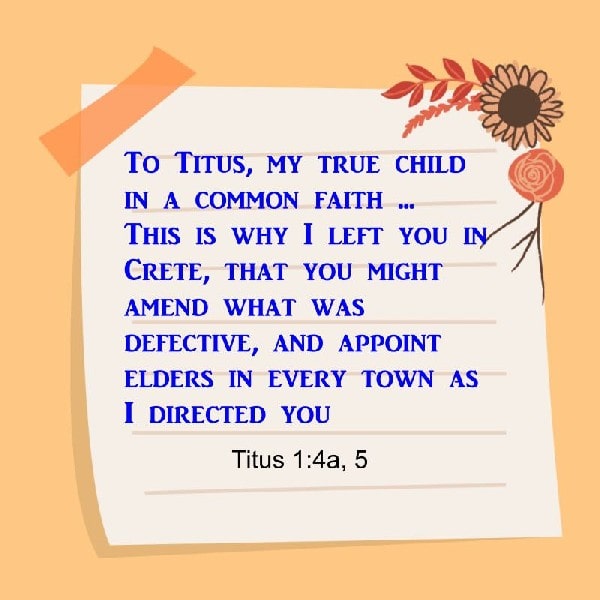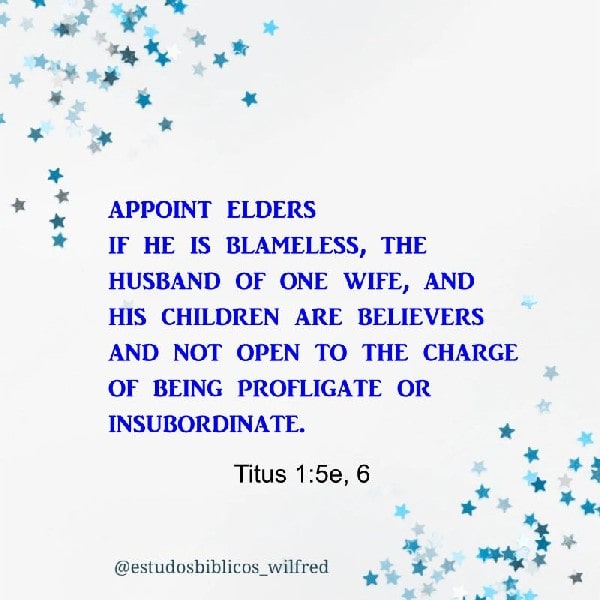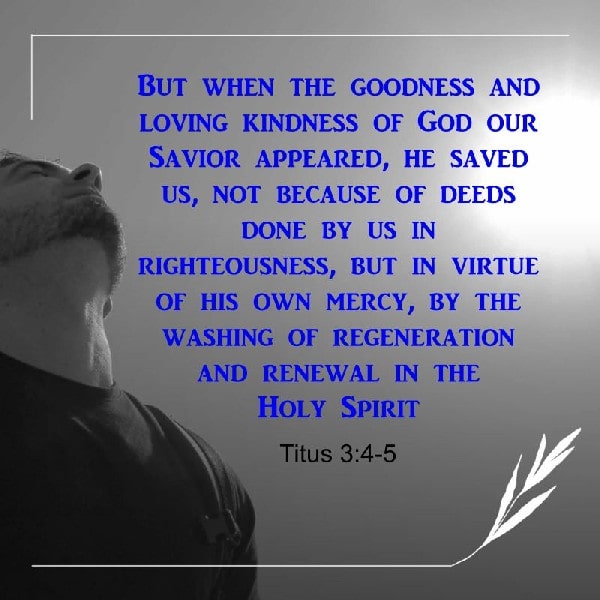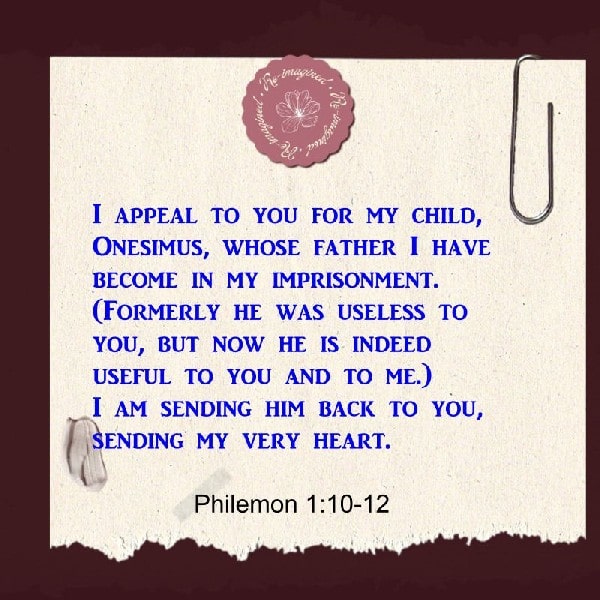Bible study Daily, explanation and encouragement - Titus and Philemon
Capítulo
The letter to Titus, like Timothy, was a young minister who followed Paul’s leadership and was being overseen by the church in Crete. This church seemed disorganized and full of people who needed much instruction and correction. To help Titus, Paul wrote this letter, which addresses several of the issues he also wrote about in 1 Timothy.
Paul writes in Titus 2:14 "Jesus who gave himself for us to redeem us from all iniquity and to purify for himself a people of his own who are zealous for good deeds". We must remember that people know us as believers by our fruits; we reveal our love for Jesus more through what we do than by any other means.
As you read the letter to Titus, may you remember how important it is to be in a good church and to submit to spiritual leadership that is devoted to God. So let us get started! We are excited to dive into this book and learn all that God has to teach us through this letter.
Titus 1:5

The apostle immediately addresses the reason that led him to write the letter. The words suggest that Paul had recently been in Crete accompanied by Titus, who served as his assistant. The fact that Titus was charged with ordaining elders from city to city shows the extent of this activity. What we understand is that Paul was in Crete planting churches and when he finished he left Titus to complete the task of organizing the churches. Paul's language suggests that not all was well in the Cretan churches and that part of Titus's task was to correct what was wrong.
Titus was instructed to appoint and ordain elders (or pastors) for the churches. This practice is in accordance with the apostle's custom. Regarding the consecration of pastors, there are differences in Paul's instructions between 1 Timothy and Titus. In the former, there were already bishops in office, while in the latter, probably because it was something new in the Cretan church, it was the first ordination of elders.
Titus 1:6

Paul describes the type of man to be selected for this important office.
BLAMELESS - means having “unassailable character” or “unquestionable integrity.” This is an all-important quality. A Christian elder or minister must be a person who avoids not only evil, but the very appearance of evil. In all aspects of his conduct, he must be above reproach.
THE HUSBAND OF ONE WIFE - Many in the early church considered this command to be a prohibition against remarrying for any reason. The reference here is obviously to double marriages. Modern Christian traditions do not disapprove of a believer remarrying after the death of his first wife.
HIS CHILDREN ARE BELIEVERS - This is a phrase that requires some consideration. The real meaning is having believing children. Men set apart for the office of elder or minister must be successful in passing on the Christian faith to their children. It is true that no father can control or determine the moral and spiritual decisions of his children. Sometimes, despite our best and most sincere efforts, children in the free exercise of their will make choices that cause deep suffering to their parents.
Titus 1:7

The bishop must not be arrogant or quarrelsome, he must not drink wine in excess, nor be violent, nor seek dishonest gain.
The quality of being irreproachable continues. The term HOSPITABLE literally means the administrator of a house or family. The bishop was the financial manager of the local church and for this reason, if for no other reason, he must be a man of extreme integrity.
Paul lists 5 defects that the bishop must not have. These are character flaws that, if tolerated in an ecclesiastical leader, will cause him certain ruin.
- Arrogant - someone prone to being arrogant, opinionated and stubborn.
- Quick-tempered - a hot-tempered, vengeful and impatient individual.
- He must not drink wine in excess - In the church of the 1st century this was a problem. Viticulture was abundant everywhere.
- Not be violent - of violent or arbitrary action.
- Greedy for gain - As the guardian of the church's monetary funds, this could be a source of temptation for the bishop.
In verses 8 and 9, Paul lists 6 virtues that a bishop must have: Hospitable, a lover of goodness, master of himself, upright, holy, and self-controlled.
Titus 1:15

In this passage Paul states a vitally important principle, but his generalization is fraught with possible abuse. Have we not heard these words misused? The most common abuse of these words occurs in this way. Someone says something disgusting, vulgar, or alludingly indecent, and a zealous friend protests against the vile statement. Immediately, sometimes with a smile, often with a tone of disdain, he is silenced with, "To the pure all things are pure". The devil quotes the Bible for his own purposes, and such quotation is the work of the devil. There are things that are everywhere and always right, and there are things that are everywhere and wrong, and there is little hope left for those who have learned to falsify established things. These words of Paul here must be understood in the context of the 'Jewish fables' and 'commandments of men' that the apostle denounces. These words of Paul compare with what Jesus said in Mark 7:15 "There is nothing outside a man which by going into him can defile him; but the things which come out of a man are what defile him'.
For the defiled and unbelieving, everything is clean. Such people take the most beautiful and charming things and cover them with a layer of blackened impurity. They see impure jokes where there is no impurity. But those who have a pure mind find all things pure. It is terrible to have this film of impurity and filth in the mind. Those who have a depraved understanding and a seared conscience can hardly reach the truth.
Titus 1:16

There are many who profess to know God in their words and tongue, yet in their lives and conduct they deny and reject Him. Their practice is a contradiction to their confession.
And they come to you as people come, and they sit before you as my people, and they hear what you say but they will not do it; for with their lips they show much love, but their heart is set on their gain (Ezekiel 33:31).
They are abominable and disobedient, and disqualified for every good work. Paul instructed Titus to rebuke severely, but he himself rebukes with the same severity. They deserve that God and godly men should avert their eyes from them because they are loathsome and offensive. Consider the miserable condition of hypocrites. They present the form of godliness, but they do not possess the power. We must never point out the faults of others without first looking at our own lives, lest there be within us an evil and infield heart.
The gospel of Christ must change the way people think and bear fruit in a transformed life. It was this powerful transformation that made the early church invincible. How did the Christian church defeat the entrenched paganism of the Roman Empire? The answer is that "Christians surpass the pagans in life, in death, and in thought." In every respect, Christians far exceeded the highest standards known to the pagan world. This fact is clearly illustrated here. The first three character traits prescribed for the ELDERLY are: TEMPERATE, SERIOUS, SENSIBLE. By temperate we must understand sober; certainly temperance and moderation in the use of wine, but it is also the attitude of temperance and moderation in all the pleasures of life. The Greek term translated serious also occurs in 1 Timothy 3:8 and 11 where it is applied to deacons and their wives (honest and honest). It suggests seriousness of purpose. Seriousness is not frowning. Sensible means self-disciplined or self-masters.
Paul continues his list for older men with 3 more character traits. These are faith, love and steadfastness.
So, no more grumpy, sullen and complaining elderly Christians. The elderly of Christ are not dispensable in the work of God, they are very valuable, they carry a lot of experience and life. So they need to have it in themselves and teach the younger ones to be serious, moderate and steadfastness.
Titus 2:3

The apostle counsels the OLDER WOMEN of the church to cultivate virtues similar to those that older men should have.
LIVE REVERENT, that is, be reverent in your manner of living. The Greek term translated worthy or reverent literally means, "to humble oneself as a priestess in the performance of one’s duties". Mature women should be devoted to spiritual things. In our day there is a shortage of the holy women of old. Women who know Jesus and love Him, women for whom the privilege of ministering to the Lord is the highest joy in life, women like those who honored the house of Mary and Martha in Bethany; such women are needed in the church today and tomorrow.
Titus 2:12-13

Paul instructed Titus to teach sound doctrine and lead people to live righteously so that they could be identified as true Christians.
One of the greatest needs of the church today is credibility. The reputation of Christianity has been terribly tarnished by people who told others what to do but did not live their lives as a good Christian should; in other words, they paid lip service.
We must choose a lifestyle of excellence that demonstrates the true attributes of Jesus Christ.
How you live your life matters a lot! When you put a Christian sticker on your car, wear jewelry with the Cross or T-shirts with verses on them, and go to church, people notice you — and they are looking for authenticity.
The Bible is full of instructions on how to live. It teaches us how to think, speak, and act, and it also teaches us who to associate with and how to manage our money.
What good does it do to have a car sticker that says "Jesus loves you" and then excee the speed limit, not wear a seatbelt, or park in a handicapped parking when you behave not accordingly to the sticker?
Let us constantly examine our lives and make sure that we are truly representing who we say we believe.
Titus 2:12-13

This verse serves as a summary of the ethical demands imposed on men by the Christian message that Paul preached. It has a negative and a positive aspect. The first requirement is that we renounce ungodliness and worldly lusts. This does not mean that we must free ourselves from ties to the world, something that no one can do. It is our task, as helped by the Spirit, to renounce ungodly ways and worldly desires.
LIVING WITH WISDOM, RIGHTEOUSNESS AND DEVOTION - That is, we live a life of self-control, integrity and holiness. This is the life of man in his threefold relationship:
1- With himself
2- With his fellow men
3- With God
Man must learn to control his own passions, to treat his neighbor with justice and to worship and obey God.
Titus 2:14

Most people are familiar with the term
VIP - Very Important Person.
Did you know that Jesus gave Himself for you to make you special to Himself?
He redeemed you from evil and made you holy.
He also set you apart for good works.
Ask God to show you day by day the good works He has prepared for you to do, and be eager to do them!
In Romans 13:1-7, Paul states his philosophy of government quite clearly, beginning with the words: "Let every person be subject to the governing authorities. For there is no authority except from God, and those that exist have been instituted by God."
In this view, the state derives its authority from God. This is not to say that these powers are never exercised by the consent of those governed. It simply states that, among equals, we must respect and obey civil authorities. In these words, Paul does not exclude the right of Christians to resist persecution or official attempts to suppress religious freedom. The time will come when the heavy hand of the state would fall upon the church and the only course for the Christian could be civil disobedience.
BE READY FOR HONEST WORK - Christians should be prepared to serve the community in every constructive way they can. This may mean running for and serving in office, or taking an active part in worthwhile projects to promote charitable institutions and the welfare of children. No one should exempt himself from the performance of his civic responsibilities on the pretext that, although he is in the world, he does not belong to the world.
Titus 3:2

Here in verse 2, the apostle continues his outline of Christian civic behavior: Let no one be slandered. We must understand these directives in the context of both the church and civic life. There are three tests we must subject every disparaging comment we are tempted to make about others:
1. Is it true?
2. Is it good?
3. Is it necessary?
How often would the application of these three parameters effectively shut our mouths!
AVOID QUARRELS - Avoid having a spirit of altercation that leads to quarrels. Instead, Paul insists, be modest. Some connotations of modest are calm, kind, and affable, which are distinctly Christian qualities.
A blessed 2025 to all!
Titus 3:4-5

Here the apostle is thinking of the miracle of justification by faith, and the gracious forgiveness of past sins — a forgiveness that has come to us through the coming of the Son of God into the world. Paul sees in the incarnation of the Son of God the dawning of a new day for human affairs. God’s saving intervention on our behalf is entirely a matter of Divine grace, and is in no way the result of human merit. This fact is made clear in verse 5: He saved us, not because we had done anything righteous, but because of His mercy. He washed us of our sins, caused us to be born again, and gave us new life through the Holy Spirit.
The absolute impossibility of human performance of righteous works is a frequent theme of the apostle, and he dwells on it most in the opening chapters of Romans. Paul is speaking of the futility of any human hope that would merit God’s grace. There is nothing we can do that would make Almighty God owe us favors. Salvation is not "of works" (Eph. 2:9), but entirely of grace.
Titus 3:6

Another aspect of the experience of salvation is the renewal of the Holy Spirit. The Holy Spirit, in the expression of the ancient creeds of the church, is "the Lord and giver of life". This involves the whole of life in all its manifestations. But in a sense it is the forgiven and renewed sinner in whom he has been quickened by the Holy Spirit. This life is the exclusive work of the Holy Spirit - in its beginning, growth and increase, and fullness.
The wine-giving function of the Holy Spirit is closely related to the redemptive and intercessory work of the Lord Jesus. He proclaimed that the gift of the Spirit would be given by the Father and through Him (John 14:26; 16:7). It is this teaching that is represented in the doctrine of the "double procession" of the Holy Spirit; He proceeds from both the Father and the Son. His measure is related to our Lord’s return to the right hand of the Father (John 7:39). The coming of the Holy Spirit on the day of Pentecost was regarded as a gift by the glorified Savior (Acts 2:33). And every regenerated soul is quickened by this same quickening Spirit.
Titus 3:7

Justification is one of the authentic themes of Pauline thought. He taught that by surrendering oneself to and believing in Christ, forgiveness of sins is assured, and the sinner himself, whatever his past, is received into the grace and favor of God. But here there is more than the promise of the life that now exists: for the HOPE OF ETERNAL LIFE is given equally to every sinner who turns to God through Christ.
The Epistle to Philemon. TARGET: Most commentators accept the traditional interpretation that this was a personal letter from Paul written to Philemon in Colosse (Col. 4:8, 9).
PURPOSE: The letter is addressed primarily to an individual, Philemon, but also to the church that meets in his home.
The problem concerns the institution of slavery, the trafficking in human lives, and what the Christian response should be. The problem is not just personal and private, as in this case; it is a public problem that the entire Christian community and the world at large must face and resolve (Col. 3:22 - 4:1).
What will Paul say and do in the face of such a dilemma? He pits his faith against a culture and a system of government that tolerates and protects the trafficking in human lives.
Paul does not attack slavery directly. He does not counsel rebellion or defiance of the prevailing law and order. On the contrary, he counsels obedience to the government (Rom. 13:1). What the apostle does is raise the issue to a lofty spiritual level. He solves the slavery issue not by compulsion but by redemption.
Paul shows that the believing slave is just as truly a Christian brother and is just as truly in Christ as the believing Lord (Rom. 12:4-5).
All believers are equally in Christ and are therefore members of the body of Christ. Although each member has a function and there are distinctions between the members, each member is indispensable to the body (Eph. 4:11-16). All members are to "submit to one another out of respect for Christ' (Eph. 5:21).
What Paul does is inject the Christian solution into the prevailing culture. And this thought of Paul has been and continues to infiltrate and spread throughout society until it reaches its final improvement and correction (Matt. 13:33).



